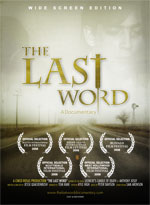 We received copies of a DVD of a documentary on Johnny Garrett. We plan to tell the Capital Punishment Subcommittee about this case at the hearing on the moratorium bill Thursday, April 2, at 8 AM in room E2.016 in the Texas Capitol in Austin.
We received copies of a DVD of a documentary on Johnny Garrett. We plan to tell the Capital Punishment Subcommittee about this case at the hearing on the moratorium bill Thursday, April 2, at 8 AM in room E2.016 in the Texas Capitol in Austin.
Jesse Quackenbush, the director, spoke at a rally on our 2005 Lobby Day Against the Death Penalty at the Texas capitol.
http://www.
|
The Last Word
|
||||||
|
Director, Jesse Quackenbush
Narrator, Tom Kane Composer, Peter Davison 90 Minutes SYNOPSIS
|
||||||
 |










